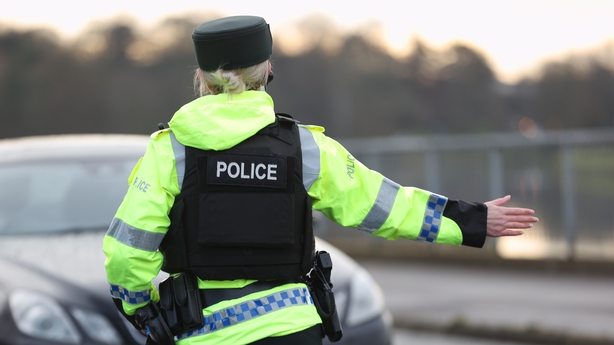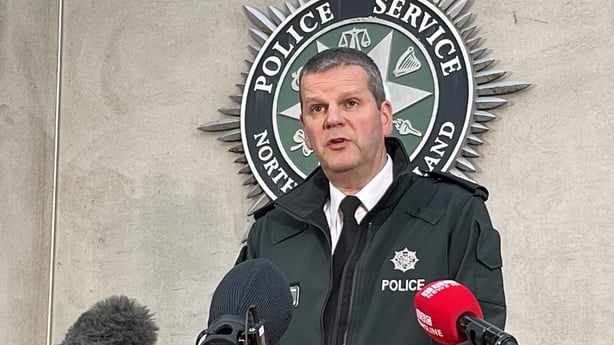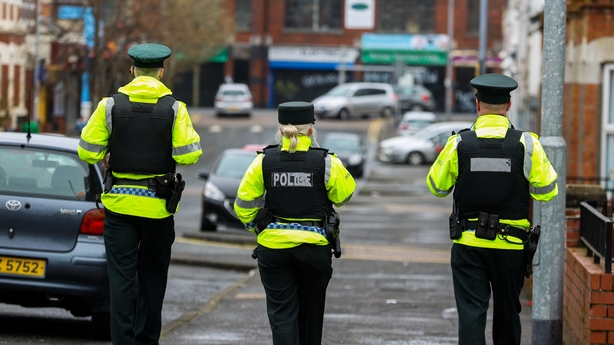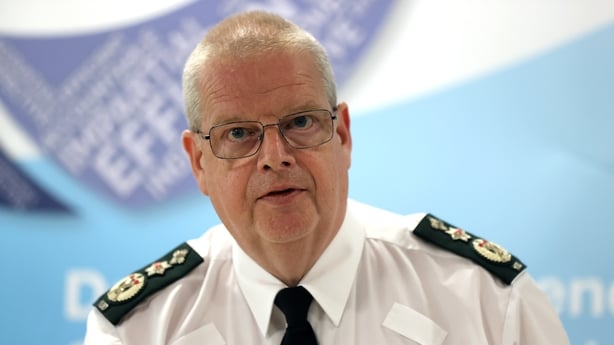"You can only imagine the unconscionable horror as people start to realise that maybe a loved one is being put in jeopardy" - PSNI Chief Constable Simon Byrne putting into words how families right across Northern Ireland felt this week, as news of a monumental data breach broke.
The surnames, initials, ranks, departments and locations of more than ten thousand personnel were published online, leading to fears for their safety.
This "industrial scale" breach, as he put it, affects every single member of the force; both officers and civilians, from the very bottom, to the top brass.
For many in the PSNI, from civilian staff to high ranking officers, protecting their identities is of the utmost importance and even more crucial for those officers working in sensitive areas like surveillance and intelligence gathering.
Particular concerns were also raised for Catholic officers.
In the past, they had been targets of republican paramilitaries who sought to discourage them from joining the police force.
In some cases, officers and staff will have kept their jobs secret from their own families, their friends, and even moved from their communities, in a Northern Ireland where the threat to PSNI officers is severe.
This threat was increased in March and followed an attempt on the life of Detective Chief Inspector John Caldwell in February.
Just how widely this precious information was accessed or subsequently circulated is still under investigation, but the immediate impact of this has been felt by those in the PSNI and their families.

Unprecedented crisis
It all started late on Tuesday evening, when the media was invited to the PSNI headquarters in Belfast for a press conference just before 9pm.
It was here that the serious nature of what had occured just hours earlier was revealed.
A spreadsheet containing all of this data was mistakenly attached to a response to an FOI request, and published on a freedom of information website on Tuesday afternoon, where it remained for up to three hours.
Initially, the PSNI used the term "human error" to describe what had happened.
Early on, it was believed that a relatively junior member of staff was involved in handling the material.
Later in the week though, it became clear that the PSNI's own systems and procedures had failed.
Assistant Chief Constable Chris Todd, who is the Senior Information Risk Owner at the PSNI, said that the information "passed through the hands of a number of individuals in the organisation" and that the incident revealed an issue with the systems process.
One immediate change that has happened since Tuesday, is that information will no longer be issued using spreadsheets, and instead, PDFs will be used.

Second data breach
Around 24 hours after this monumental error, came another blow for the force.
News of a second serious data breach had emerged, this one had occured more than a month earlier.
The stolen equipment has not been recovered, but police have the capability to remotely wipe the contents of the equipment and "are quite confident that any information on those two devices will not be accessible by a third party".
However, the documents contained a spreadsheet with names of more than 200 PSNI staff.
This theft was not reported to the office of Assistant Chief Constable Todd until 27 July and this three week gap is the subject of an investigation by police.
The Information Commissioner has been informed of both of these data breaches and is investigating.
Jigsaw analysis
The reaction from the policing community and the political realm was swift and damning.
All were agreed that this kind of information, in the wrong hands, could put lives at risk.
Some said that it could have been worse, and thankfully, other more personal data like home addresses or car registrations did not make it into the public domain.
But this did not detract from the seriousness of this data breach.
Police said they were concerned about what they termed "jigsaw analysis", that people may use the data that was published and piece it together with other information, to try to establish the identities of PSNI officers and staff.
Those with unusual surnames, for example, could be at a higher risk of early identification.
By Thursday, an "early worst case scenario" was being discussed by police - "that third parties would attempt to use this data to intimidate, corrupt or cause harm to officers".

This claim, is just that, as the PSNI has yet to verify the substance behind it.
As one policing board member, UUP MLA Mike Nesbitt said, dissident republicans "would say that, wouldn't they?".
"Because its in their interest to spread maximum fear and panic within the policing community," Mr Nesbitt said.
Updated security advice was issued to all personnel, and an emergency threat assessment group was established, to triage PSNI officers and staff and determine the level of risk they may be facing.
By last night, 1,200 PSNI officers and staff had been referred to this group.
These are individuals whose circumstances might put them or their families at an immediate risk or increased threat of harm.
This number had doubled since Thursday.
It had raised concerns around the "particular sensitivities" of their members and fears this incident could impact on the future recruitment of PSNI officers from Catholic communities.
The PSNI said that Chief Constable Simon Byrne listened to the issues or concerns and reiterated his priority to the welfare and safety of all officers and staff.

Investigation
An investigation into both data breaches is ongoing.
Part of this is establisheing who may have had access to the data once it appeared on that freedom of information website on Tuesday afternoon.
The PSNI says its working with a third party on this part of their investigation.
The breaches had to be reported to the Information Commissioner, who is also investigating.
John Edwards, said the incident had raised serious concerns and showed how "even the smallest of human errors can have major consequences".
"The incident demonstrates just how important it is to have robust measures in place to protect personal information, especially in a sensitive environment", he said.
Also seeking answers, is the PSNI’s oversight body, the Northern Ireland Policing Board.
It had what it described as "robust" exchanges with the PSNI during an emergency meeting on Thursday.
Board Chair Deirdre Toner said the board impressed upon the PSNI the need to ensure every necessary step will be taken to reassure and protect affected staff, and to put the safeguards in place that will ensure this cannot happen again.
An "end to end" review of the PSNI’s information security management has been announced.
The scope of which and expertise required to carry it out, will have to be agreed between the board and the PSNI.
Consequences
PSNI officers and staff are shocked, anxious and angry following this data breach.
Safeguarding its personnel is the main focus of the PSNI at the moment.
Attention will later turn to rebuilding the trust of its workforce and the public.
Chief Constable Byrne accepted there had been a breach of trust and that the PSNI will be dealing with the human, reputational and possibly financial consequences as a result of this incident.
This will all take time.
The Northern Ireland Policing Board said this "very grave matter" will remain its focal point for many months to come.
Read more: PSNI apologises to officers, civilian staff after major data breach







